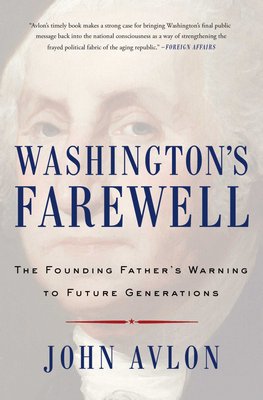
We have lately been reminded that America is a “creedal” nation, a creed being a formal statement of belief or purpose. There are certain documents, statements, proclamations and speeches that embody the truths our nation adheres to and is inspired by. In addition to the Declaration of Independence, there are various speeches that move and inspire us. We think, for instance, of the Gettysburg Address and Lincoln’s two inaugural addresses. The speeches of FDR and Martin Luther King’s “I Have a Dream” speech.In his new book, “Washington’s Farewell,” (Simon & Schuster, 354 pp., $27) John Avlon makes the case for Washington’s Farewell Address. Mr. Avlon, who spends his summers in Sag Harbor, is the editor-in-chief of the online magazine The Daily Beast. (The Daily Beast was named by its founder, Tina Brown, after one of the two newspapers in Evelyn Waugh’s classic novel, “Scoop.” The Beast is one. The Brute is the other.) The Daily Beast is a lively mixture of straight reporting and opinion. Mr. Avlon is also the author of “Wingnuts: How the Lunatic Fringe Is Hijacking America” and an editor of the anthology “Deadline Artists: America’s Greatest Newspaper Columns.”
Mr. Avlon refers to Washington’s Farewell as “The Old Testament” to which Lincoln’s great speeches are “The New Testament.”
After Washington’s first term he was planning on retiring, but he was persuaded to remain for another term to provide stability and to pour oil on the factional waters, though he had begun work on his first “farewell address.” This was the period that saw the birth of political parties, the Federalist and the Democratic-Republican parties. Both parties trusted Washington and realized that it would be best for the fledgling country for Washington to remain. And so he did. Washington belonged to no party, and thus was our nation’s only independent President.
Toward the end of his second term, Washington began thinking about a farewell address to the nation, a parting gift to the nation. He enlisted the aid of James Madison to act as speechwriter of the draft begun during his first term.
For the final farewell address, Washington asked for the help of Alexander Hamilton. It was to be a distillation of a lifetime of rumination and a very intense period of reflection while in office. Ironically, Hamilton was the bitter enemy of Madison. John Jay proofread and offered editorial suggestions. Thus were the three authors of “The Federalist Papers” united in writing yet another classic document. It is important to realize that though three of the best writers in America at the time were involved in its production, the ideas were Washington’s. Drafts traveled by horseback from Washington to Hamilton and back again. It is important to note that though the words were those of Hamilton and Madison, the ideas were those of Washington.
Washington took this very seriously, a moral guide for the fledgling nation. He called for greater unity between the states. He praised religious pluralism, as well as moral virtue, and proposed a foreign policy of independence (which is not the same as isolation), and avoidance of debt, while at the same time establishing a precedent for the peaceful transfer of power. Washington referred to these as the “six pillars of liberty.” Mr. Avlon ties these to lessons Washington learned throughout his life.
For years the Farewell Address had an almost religious significance. It was memorized in schools and was read in Congress every year on Washington’s birthday. Today it has become what Mr. Avlon calls “the most famous American speech you’ve never read.” Incidentally, it was a speech that Washington never delivered. He had it published in a newspaper.
“Washington’s Farewell” is a very good book, a brilliant evocation of the early days of the Republic, and of the political disputes that often make our own seem mild by comparison. It is a portrait of the time and a portrait of a man of immense dignity and integrity, a man who has been described as not being an intellectual, yet knew how to handle tense situations. This doesn’t do him justice. He was, in fact, an intellectual. His private library upon his death contained 900 volumes, books on agriculture, political economy, history, philosophy, fiction, and poetry.
Washington was not perfect. He was a slaveholder, it is true. But on his deathbed, he was clearly troubled that he was about to meet his maker with this great stain on his conscience, so he freed his slaves.
Reading about this extraordinary man, one can only think, to paraphrase Wordsworth, “Washington, thou shouldst be living at this hour. America hath need of thee.”